
Dynamic Mockups: Complete Buyer's Guide
API-driven automation platform for bulk mockup generation
Dynamic Mockups positions itself as an API-driven automation platform specializing in bulk mockup generation through Photoshop smart object integration. The vendor targets e-commerce sellers and design teams requiring high-volume product visualization, differentiating through custom PSD template support and programmatic rendering capabilities rather than pre-built template libraries[39][42].
Market Position & Maturity
Market Standing
Dynamic Mockups operates in the automation segment of the design tool market rather than the AI design category, competing more directly with workflow automation tools than innovative AI design platforms[45][50].
Company Maturity
Company maturity indicators suggest established operations with responsive customer support and rapid feature development cycles. Customer testimonials highlight the support team's responsiveness in addressing integration challenges and adding requested features quickly[42].
Growth Trajectory
Growth trajectory evidence remains limited in available research, though customer testimonials suggest ongoing platform development and feature enhancement based on user feedback[42].
Industry Recognition
Industry recognition and third-party validation data are not available in current research sources, limiting assessment of broader market recognition and analyst positioning.
Longevity Assessment
Long-term viability appears supported by the platform's focus on automation workflows that address genuine business needs in e-commerce and print-on-demand sectors. However, the vendor's positioning outside the rapidly evolving AI design space may limit growth potential as the market increasingly demands genuine AI capabilities rather than template automation.
Proof of Capabilities
Customer Evidence
Customer evidence includes Libor Bednarik's successful API integration achieving 'much easier and faster' mockup creation, with responsive support during implementation challenges and rapid feature development cycles[42].
Quantified Outcomes
Quantified performance claims include 100 mockup variations generated in 10 seconds and 60% cost reduction versus manual methods[40][48][51], though these metrics require independent verification.
Market Validation
The vendor reports serving 12,000+ brands[48], indicating substantial market adoption within its target segments of e-commerce sellers and print-on-demand businesses.
AI Technology
AI capabilities remain questionable despite vendor claims. While Dynamic Mockups promotes AI-assisted background generation and negative prompt editing capabilities[48], available evidence suggests the platform primarily leverages automation technology rather than genuine machine learning algorithms[45][50].
Architecture
Dynamic Mockups operates on an API-driven automation architecture that leverages Photoshop smart object technology for bulk mockup generation. The platform's core technical foundation centers on automated smart object replacement in Photoshop files, enabling programmatic rendering of product mockups for apparel, mugs, and similar e-commerce products[39][42].
Primary Competitors
Primary competitors include template-focused platforms like Canva and Mockey for basic mockup needs, and automation tools serving e-commerce workflows.
Competitive Advantages
Competitive advantages center on custom template control and bulk processing efficiency. The platform's ability to process proprietary Photoshop templates with smart objects differentiates it from template-library approaches, particularly benefiting businesses with established design systems requiring scaled mockup generation[39][42].
Market Positioning
Market positioning places Dynamic Mockups as an automation solution rather than creative design platform. While effective for specific use cases involving high-volume, template-based mockup generation, the platform competes more directly with workflow automation tools than innovative AI design platforms targeting creative professionals[45][50].
Win/Loss Scenarios
Win scenarios favor Dynamic Mockups when organizations need high-volume mockup requirements with consistent templates, custom template control over pre-built options, API integration for programmatic generation, and cost-effective automation over creative flexibility[39][42][50]. Loss scenarios occur when organizations prioritize real-time collaboration and creative assistance, extensive pre-built template libraries, AI-powered design innovation, and simple plug-and-play functionality without technical complexity[11][12][19][31].
Key Features

Pros & Cons
Use Cases
Integrations
Pricing
Featured In Articles
Comprehensive analysis of AI Mockup Generators for AI Design for AI Design professionals. Expert evaluation of features, pricing, and implementation.
How We Researched This Guide
About This Guide: This comprehensive analysis is based on extensive competitive intelligence and real-world implementation data from leading AI vendors. StayModern updates this guide quarterly to reflect market developments and vendor performance changes.
57+ verified sources per analysis including official documentation, customer reviews, analyst reports, and industry publications.
- • Vendor documentation & whitepapers
- • Customer testimonials & case studies
- • Third-party analyst assessments
- • Industry benchmarking reports
Standardized assessment framework across 8 key dimensions for objective comparison.
- • Technology capabilities & architecture
- • Market position & customer evidence
- • Implementation experience & support
- • Pricing value & competitive position
Research is refreshed every 90 days to capture market changes and new vendor capabilities.
- • New product releases & features
- • Market positioning changes
- • Customer feedback integration
- • Competitive landscape shifts
Every claim is source-linked with direct citations to original materials for verification.
- • Clickable citation links
- • Original source attribution
- • Date stamps for currency
- • Quality score validation
Analysis follows systematic research protocols with consistent evaluation frameworks.
- • Standardized assessment criteria
- • Multi-source verification process
- • Consistent evaluation methodology
- • Quality assurance protocols
Buyer-focused analysis with transparent methodology and factual accuracy commitment.
- • Objective comparative analysis
- • Transparent research methodology
- • Factual accuracy commitment
- • Continuous quality improvement
Quality Commitment: If you find any inaccuracies in our analysis on this page, please contact us at research@staymodern.ai. We're committed to maintaining the highest standards of research integrity and will investigate and correct any issues promptly.